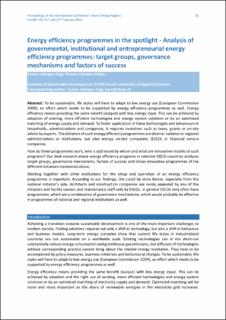Please use this identifier to cite or link to this item:
https://doi.org/10.21256/zhaw-4241| Publication type: | Conference paper |
| Type of review: | Not specified |
| Title: | Energy efficiency programmes in the spotlight - analysis of governmental, institutional and entrepreneurial energy efficiency programmes : target groups, governance mechanisms and factors of success |
| Authors: | Lobsiger-Kägi, Evelyn Carabias-Hütter, Vicente |
| DOI: | 10.21256/zhaw-4241 |
| Proceedings: | Proceedings of the International Conference ‘Smart Energy Regions’ : Cardiff, UK, 11th and 12th February 2016 |
| Editors of the parent work: | Patterson, Jo Varriale, Fabrizio |
| Page(s): | 31 |
| Pages to: | 44 |
| Conference details: | International Conference Smart Energy Regions, Cardiff, United Kingdom, 11-12 February 2016 |
| Issue Date: | 2016 |
| Publisher / Ed. Institution: | The Welsh School of Architecture, Cardiff University |
| Publisher / Ed. Institution: | Cardiff |
| ISBN: | 978-1-899895-23-6 |
| Language: | English |
| Subjects: | Target group; Programme; Governance; Energy efficiency |
| Subject (DDC): | 333.79: Energy |
| Abstract: | To be sustainable, life styles will have to adapt to low energy use (European Commission 2009), an effort which needs to be supported by energy efficiency programmes as well. Energy efficiency means providing the same benefit (output) with less energy input. This can be achieved by adoption of existing, more efficient technologies and energy system solutions or by an optimized matching of energy supply and demand. To foster application of these technologies and behaviours in households, administrations and companies, it requires incentives such as taxes, grants or on-site advice by experts. The initiators of such energy efficiency programmes are diverse: national or regional administrations or institutions, but also energy service companies (ESCO) or financial service companies. How do these programmes work, who is addressed by whom and what are innovative models of such programs? Our desk research about energy efficiency programs in selected OECD-countries analyses target groups, governance mechanisms, factors of success and shows innovative programmes of the different initiators mentioned above. Working together with other institutions for the setup and operation of an energy efficiency programme is important. According to our findings, this could be done better, especially from the national initiator’s side. Architects and construction companies are rarely appealed by any of the initiators and facility owners and maintenance staff only by ESCOs. In general ESCOs very often have programmes, which are a combination of governance mechanisms, which would probably be effective in programmes of national and regional institutions as well. |
| URI: | https://digitalcollection.zhaw.ch/handle/11475/5961 |
| Fulltext version: | Published version |
| License (according to publishing contract): | Licence according to publishing contract |
| Departement: | School of Engineering |
| Organisational Unit: | Institute of Sustainable Development (INE) |
| Published as part of the ZHAW project: | Towards Smart Energy Regions: Exploring Future Energy-Systems at Regional Level |
| Appears in collections: | Publikationen School of Engineering |
Files in This Item:
| File | Description | Size | Format | |
|---|---|---|---|---|
| 2016_Lobsiger-Kägi_Energy_efficiency_programmes_in_the_spotlight.pdf | 209.13 kB | Adobe PDF |  View/Open |
Show full item record
Lobsiger-Kägi, E., & Carabias-Hütter, V. (2016). Energy efficiency programmes in the spotlight - analysis of governmental, institutional and entrepreneurial energy efficiency programmes : target groups, governance mechanisms and factors of success [Conference paper]. In J. Patterson & F. Varriale (Eds.), Proceedings of the International Conference ‘Smart Energy Regions’ : Cardiff, UK, 11th and 12th February 2016 (pp. 31–44). The Welsh School of Architecture, Cardiff University. https://doi.org/10.21256/zhaw-4241
Lobsiger-Kägi, E. and Carabias-Hütter, V. (2016) ‘Energy efficiency programmes in the spotlight - analysis of governmental, institutional and entrepreneurial energy efficiency programmes : target groups, governance mechanisms and factors of success’, in J. Patterson and F. Varriale (eds) Proceedings of the International Conference ‘Smart Energy Regions’ : Cardiff, UK, 11th and 12th February 2016. Cardiff: The Welsh School of Architecture, Cardiff University, pp. 31–44. Available at: https://doi.org/10.21256/zhaw-4241.
E. Lobsiger-Kägi and V. Carabias-Hütter, “Energy efficiency programmes in the spotlight - analysis of governmental, institutional and entrepreneurial energy efficiency programmes : target groups, governance mechanisms and factors of success,” in Proceedings of the International Conference ‘Smart Energy Regions’ : Cardiff, UK, 11th and 12th February 2016, 2016, pp. 31–44. doi: 10.21256/zhaw-4241.
LOBSIGER-KÄGI, Evelyn und Vicente CARABIAS-HÜTTER, 2016. Energy efficiency programmes in the spotlight - analysis of governmental, institutional and entrepreneurial energy efficiency programmes : target groups, governance mechanisms and factors of success. In: Jo PATTERSON und Fabrizio VARRIALE (Hrsg.), Proceedings of the International Conference ‘Smart Energy Regions’ : Cardiff, UK, 11th and 12th February 2016. Conference paper. Cardiff: The Welsh School of Architecture, Cardiff University. 2016. S. 31–44. ISBN 978-1-899895-23-6
Lobsiger-Kägi, Evelyn, and Vicente Carabias-Hütter. 2016. “Energy Efficiency Programmes in the Spotlight - Analysis of Governmental, Institutional and Entrepreneurial Energy Efficiency Programmes : Target Groups, Governance Mechanisms and Factors of Success.” Conference paper. In Proceedings of the International Conference ‘Smart Energy Regions’ : Cardiff, UK, 11th and 12th February 2016, edited by Jo Patterson and Fabrizio Varriale, 31–44. Cardiff: The Welsh School of Architecture, Cardiff University. https://doi.org/10.21256/zhaw-4241.
Lobsiger-Kägi, Evelyn, and Vicente Carabias-Hütter. “Energy Efficiency Programmes in the Spotlight - Analysis of Governmental, Institutional and Entrepreneurial Energy Efficiency Programmes : Target Groups, Governance Mechanisms and Factors of Success.” Proceedings of the International Conference ‘Smart Energy Regions’ : Cardiff, UK, 11th and 12th February 2016, edited by Jo Patterson and Fabrizio Varriale, The Welsh School of Architecture, Cardiff University, 2016, pp. 31–44, https://doi.org/10.21256/zhaw-4241.
Items in DSpace are protected by copyright, with all rights reserved, unless otherwise indicated.